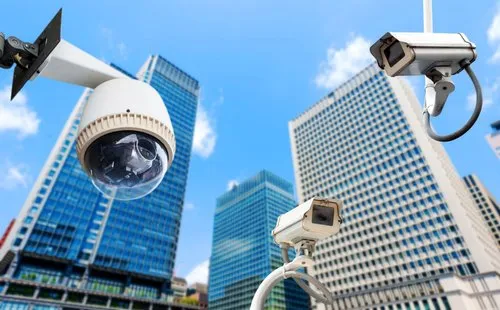Boult Audio Z40 Ultra Truly Wireless in Ear Earbuds with 32dB Active Noise Cancellation, 100H Playtime, Dual Device Pairing, Quad Mic ENC, 45ms Low Latency, Metallic Finish ANC Ear Buds (Jet Black)
₹1,599.00 (as of February 2, 2025 20:52 GMT +05:30 - More infoProduct prices and availability are accurate as of the date/time indicated and are subject to change. Any price and availability information displayed on [relevant Amazon Site(s), as applicable] at the time of purchase will apply to the purchase of this product.)When it comes to securing your home, one of the most effective solutions is CCTV camera installation. In Dubai, where safety and security are a priority, more and more apartment owners are turning to CCTV systems to ensure the protection of their families and belongings. If you're new to installing CCTV cameras, this guide will help you understand the basics and provide the necessary steps to get your system up and running in your apartment.
Why Choose CCTV Camera Installation?
CCTV systems provide continuous surveillance of your apartment, offering peace of mind for both residents and property owners. With CCTV camera installation, you can monitor high-risk areas such as entrances, hallways, and common spaces. Additionally, in the event of a security breach, the footage can serve as valuable evidence for law enforcement.
Benefits of CCTV installation:
- Real-time monitoring: See live footage from your home on your phone or computer.
- Deter criminal activity: The visible presence of cameras discourages potential intruders.
- Evidence for security incidents: Recorded footage can be used for investigations or insurance claims.
Understanding the Basics of CCTV Installation
Before diving into the installation process, it's essential to understand the basic components of a CCTV system. These typically include cameras, a digital video recorder (DVR), or network video recorder (NVR) and a display monitor. With a clear understanding of these components, you can begin the installation process confidently.
Key components of a CCTV system:
- Cameras: Choose between wired or wireless cameras depending on your apartment layout.
- DVR/NVR: Record footage and store it for future use, depending on whether you select an analog or IP-based system.
- Monitor: View live or recorded footage to ensure everything is under control.
Planning Your CCTV Installation
The first step in installing CCTV in your apartment is proper planning. Consider your apartment's layout and the areas you wish to monitor. High-traffic areas such as front doors, living rooms, and hallways are common places for camera installation. Additionally, ensure that cameras are strategically positioned to avoid blind spots.
Tips for planning CCTV camera placement:
- Cover all entry points: Install cameras at main entrances and exits, such as doors and windows.
- Target common areas: Capture hallways, living rooms, and other shared spaces within the apartment.
- Avoid obstructions: Ensure cameras have an unobstructed view and are not blocked by furniture or other objects.
Choosing the Right Type of CCTV System
There are various types of CCTV systems available, and choosing the right one for your apartment is crucial. Some apartments are better suited for wired systems, while others may benefit from the flexibility of wireless cameras. CCTV camera installation UAE often includes options such as HD cameras, PTZ (pan-tilt-zoom) cameras, and even smart cameras that can connect to your smartphone.
Factors to consider when choosing your system:
- Wired vs. wireless: Wired systems offer reliability but require installation of cables, while wireless cameras provide easier installation and flexibility.
- Resolution: Higher-resolution cameras provide clearer images, essential for identifying faces or reading license plates.
- Smart features: Look for cameras with motion detection, remote viewing, and night vision.
Installation Process for CCTV Cameras
Once you’ve selected your cameras and planned their placement, the next step is to install the system. Start by positioning the cameras on walls or ceilings, making sure they are secure and directed toward high-risk areas. For wired systems, you'll need to run cables from the cameras to the DVR or NVR. Wireless cameras require a reliable Wi-Fi connection to function correctly.
Basic steps for CCTV installation:
- Mount the cameras: Use brackets and mounts to secure cameras in the desired locations.
- Run the cables (for wired systems): Ensure cables are neatly hidden or protected to avoid damage.
- Connect to power: Ensure each camera has a reliable power source, either through a direct plug or battery.
- Set up the DVR/NVR: Connect the cameras to the recording device and configure the system.
Testing and Configuring Your CCTV System
After installation, it’s important to test your CCTV system to ensure everything works as expected. Check the camera angles to ensure they cover the intended areas. Review the video feed to confirm the clarity of the footage and adjust settings such as motion detection sensitivity or recording schedules.
Steps for testing and configuration:
- Verify camera angles: Ensure each camera covers the key areas without obstruction.
- Check video quality: Test the resolution and make sure the footage is clear, both during the day and at night.
- Configure settings: Adjust motion detection, notifications, and storage options according to your needs.
Remote Monitoring and Alerts
Many modern CCTV systems offer remote monitoring, which allows you to view live footage from your smartphone or computer. This is especially useful when you're away from home and want to check on your apartment's security. Some systems also send instant alerts if they detect motion or unusual activity, allowing you to respond quickly.
Advantages of remote monitoring:
- Access from anywhere: View your cameras in real time on your phone or computer, whether you’re at work or on vacation.
- Instant alerts: Receive notifications if suspicious activity is detected, such as someone entering your apartment.
- Control the system remotely: Adjust settings or check footage without having to be physically present.
Maintenance and Upkeep of CCTV Systems
Regular maintenance is essential to ensure your CCTV system continues to operate effectively. Check for any obstructions blocking the camera views and clean the lenses regularly to maintain clarity. Additionally, ensure that the DVR or NVR is functioning correctly and that the recording space is sufficient for storing footage.
Tips for maintaining your CCTV system:
- Clean cameras regularly: Dust and dirt can reduce camera performance, so keep the lenses clean for clear footage.
- Check the wiring: For wired systems, inspect cables for any wear or damage.
- Update firmware: Keep your system’s firmware up to date to ensure it has the latest features and security patches.
Legal Considerations in Dubai
Before installing CCTV cameras in your apartment, it’s important to understand the legal regulations in Dubai regarding surveillance. Ensure that you do not violate the privacy of your neighbors by placing cameras in shared spaces or outside your apartment where others may be recorded. Be aware of Dubai’s laws regarding data protection and ensure your system complies with local regulations.
Legal tips:
- Respect privacy: Do not place cameras in areas where others have a reasonable expectation of privacy, such as their apartments or private balconies.
- Data protection: Ensure that the footage you collect is securely stored and not shared without proper authorization.
- Know the rules: Familiarize yourself with local CCTV laws to ensure compliance.
Conclusion
CCTV camera installation is a powerful tool for enhancing the security of your Dubai apartment. By understanding the basics of planning, installation, and maintenance, you can create a robust surveillance system that provides peace of mind. Whether you choose a wired or wireless system, integrating remote monitoring features, and adhering to local regulations will help you make the most of your CCTV system. Investing in CCTV not only protects your apartment but also ensures that you are prepared in the event of a security incident.







0 Comments